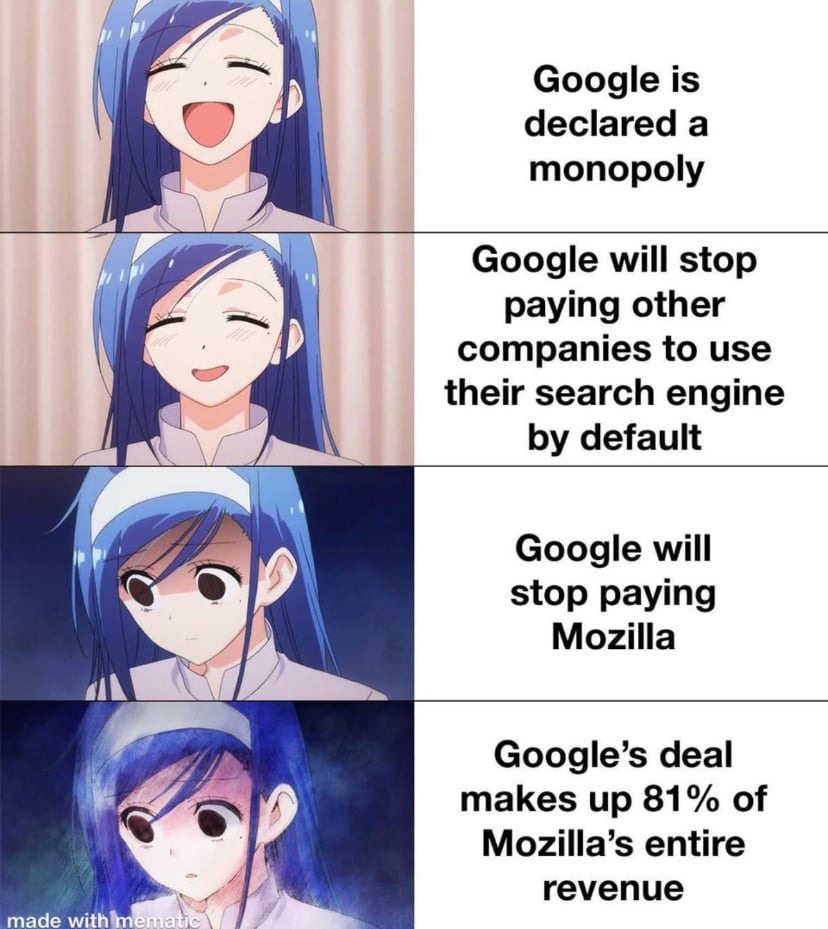this post was submitted on 08 Aug 2024
1314 points (96.2% liked)
memes
10383 readers
2533 users here now
Community rules
1. Be civil
No trolling, bigotry or other insulting / annoying behaviour
2. No politics
This is non-politics community. For political memes please go to !politicalmemes@lemmy.world
3. No recent reposts
Check for reposts when posting a meme, you can only repost after 1 month
4. No bots
No bots without the express approval of the mods or the admins
5. No Spam/Ads
No advertisements or spam. This is an instance rule and the only way to live.
Sister communities
- !tenforward@lemmy.world : Star Trek memes, chat and shitposts
- !lemmyshitpost@lemmy.world : Lemmy Shitposts, anything and everything goes.
- !linuxmemes@lemmy.world : Linux themed memes
- !comicstrips@lemmy.world : for those who love comic stories.
founded 1 year ago
MODERATORS
you are viewing a single comment's thread
view the rest of the comments
view the rest of the comments

Mozilla (not Google) got rid of the side projects, increased the CEO's salary, and laid off a bunch of employees during the pandemic. It basically got rid of the innovation that could have made Firefox a faster, more secure, and pleasant experience. Rust and Rust-based Servo, as a replacement for Gecko, were two of those side projects. These are the things Mozilla needs to invest in.
Also, I think Mozilla needs to ask the user upon install what the default search engine should be from a list of search engines including Google, Duck Duck Go, Bing, and Yahoo. Maybe the order of those could be arranged based on how much they're able to finagle from the search engines.
The real monopoly is their control over Chrome. That's what they should be forced to split from the company that owns the search engine. Development and design of Chrome should not and cannot be done by the company that runs the search engine and gets its revenue from ads.
How did Google do any of that? Wasn't that all Mozilla Corp?
Major brain fart/typo, haha.
Not saying they did, if you're paying for a thing, you a lot of control of that thing.
I'd go so far as to argue the exact same for development of: Operating systems, automotive, smartphones, residential fiber...
The ulterior motive is simply never in a user's best interest when every function ultimately becomes part of the "influence towards the purchase of goods and services" funnel.
While I find your assertion inspiring and very worthy of consideration, I have to wonder what the incentive is to sustain Android development. Apple sells the hardware that goes with its OS(es), so they get the hardware revenue (not to mention the App Store and iCloud subscription revenues). They would have to start charging devices to use their operating system or something, and I have to wonder if that would be possible under open source licenses.
I would love an open, sustained, and even open source, secure operating system for phones that's the target of app development. I think the Linux stack should should develop an NPR/PBS type ecosystem public funding of development (with maybe the corporate underwriting of those networks being equivalent to contributions from corporate employed developers to the open source code) and I'd love for it to be a real competitor in the smart phone market (knowing the Android stack modifies and sits on top of Linux).
Cuts from app purchases and in-app purchases. Of course, developers can implement their own payment gateways and distribute their apps in third party stores, but nobody would do this at risk of being removed from play store.
That's the issue that caused this. Google was paying Mozilla to be the default search engine at the top of the list in Firefox and other browsers.
Right now it's already set as the default search engine and you have to work to change it to something else as I understand it. I'm proposing that no default is set and that the user is asked to select one upon first installing Firefox from an ordered list of search engines. If that's already the case (it's been a while since I installed Firefox from scratch), then I'd argue that's fine. And it allows other search engines to contribute to be higher up in the rankings.
I can't think of anything that would replace the revenue that Google pays Mozilla that sustains the development salaries to hopefully keep Mozilla competitive and hopefully making it the best performing, convenient and private browser.